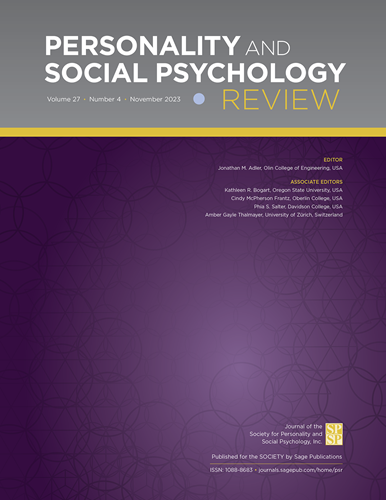Contextualizing Social Psychology Through Cultural Syndromes: The Case of Brazilian Jeitinho.
IF 10.4
1区 心理学
Q1 PSYCHOLOGY, SOCIAL
引用次数: 0
Abstract
We use the example of Brazilian jeitinho to showcase the advantages of considering culture-specific behavioral syndromes as locally meaningful sets of behavior, which recombine potentially universal psychological dynamics in culturally unique ways. This perspective allows for both universality and culture specificity in understanding human behavior. We discuss these points using jeitinho as an example. Anthropological and sociological work has demonstrated the importance of jeitinho as a Brazilian problem-solving strategy, which was treated as a single or homogenous construct. Psychological studies have identified distinct components that can be systematically linked to personality, values, and social attitudes. We describe our new theoretical approach focusing on culture-specific behavioral syndromes, in which possibly universal psychological characteristics are assembled and activated flexibly in culture-specific ways to address locally salient problems. We discuss how this novel combination of theoretical and mixed-method perspectives can advance a more situationally grounded social psychology.Public AbstractOver the decades, research in social psychology has demonstrated that cultural factors are fundamental to understanding human social behavior, but relatively little progress has been made to advance our understanding of how culture functions. We report insights gained from an interdisciplinary research program describing a cultural syndrome typical of Brazilian culture, the Brazilian jeitinho (literally translated as the Brazilian little way). Using this example, we demonstrate that it is possible to study culture-specific behaviors and link them to psychological factors presumed to be applicable to all of humanity, and by doing so, we can better understand behavior in context. This approach combines different theoretical lenses that have mainly been used independently in psychology in an integrative way that can advance a more global social psychology, making human behavior understandable across different cultural contexts.从文化综合症看社会心理学的情境化:巴西人Jeitinho的案例。
我们以巴西的jeitinho为例,展示了将文化特异性行为综合征视为具有当地意义的行为集的优势,这些行为集以文化独特的方式重新组合了潜在的普遍心理动态。这一观点在理解人类行为时兼顾了普遍性和文化特殊性。我们以jeitinho为例来讨论这些问题。人类学和社会学的工作已经证明了jeitinho作为巴西解决问题的策略的重要性,它被视为一个单一的或同质的结构。心理学研究已经确定了不同的组成部分,这些组成部分可以系统地与个性、价值观和社会态度联系起来。我们描述了我们的新理论方法,重点关注文化特异性行为综合征,其中可能普遍的心理特征以文化特异性的方式灵活地组装和激活,以解决当地的突出问题。我们讨论了这种理论和混合方法视角的新颖结合如何推进一个更基于情境的社会心理学。几十年来,社会心理学的研究表明,文化因素是理解人类社会行为的基础,但在促进我们对文化功能的理解方面取得的进展相对较少。我们报告从一个跨学科研究项目中获得的见解,该项目描述了巴西文化的典型文化综合症,巴西jeitinho(字面翻译为巴西的小路)。通过这个例子,我们证明了研究文化特定行为并将其与假定适用于所有人类的心理因素联系起来是可能的,通过这样做,我们可以更好地理解上下文中的行为。这种方法结合了心理学中主要独立使用的不同理论视角,以一种综合的方式推进了一种更加全球化的社会心理学,使人类行为在不同的文化背景下都能被理解。
本文章由计算机程序翻译,如有差异,请以英文原文为准。
求助全文
约1分钟内获得全文
求助全文
来源期刊

Personality and Social Psychology Review
PSYCHOLOGY, SOCIAL-
CiteScore
19.00
自引率
1.90%
发文量
20
期刊介绍:
Title: Personality and Social Psychology Review (PSPR)
Journal Overview:
Official journal of SPSP, the Society for Personality and Social Psychology, Inc.
Premiere outlet for original theoretical papers and conceptual review articles in all areas of personality and social psychology
Features stimulating conceptual pieces identifying new research directions and comprehensive review papers providing integrative frameworks for existing theory and research programs
Topics Covered:
Attitudes and Social Cognition: Examines the inner workings of the human mind in understanding, evaluating, and responding to the social environment
Interpersonal and Group Processes: Explores patterns of interaction and interdependence characterizing everyday human functioning
Intergroup Relations: Investigates determinants of prejudice, conflict, cooperation, and harmonious relationships between social groups
Personality and Individual Differences: Focuses on causes, assessment, structures, and processes giving rise to human variation
Biological and Cultural Influences: Studies the biological and cultural mediation of social psychological and personality processes
 求助内容:
求助内容: 应助结果提醒方式:
应助结果提醒方式:


